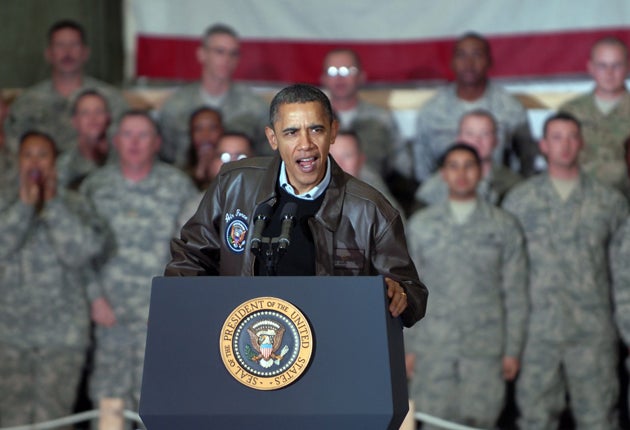CIA report undermines Obama's upbeat assessment of Afghan war

US intelligence agencies have given a pessimistic account of military progress in Afghanistan, undercutting the more upbeat assessments from the US military expected to be reflected today in President Obama's report on the war.
Some 16 intelligence agencies say in the classified National Intelligence Estimates (NIE) that large parts of Afghanistan are in danger of falling to the Taliban. They confirm that Pakistan is unwilling to end its secret support for the Taliban which uses Pakistani territory as a safe haven.
The downbeat estimates by America's intelligence agencies, including the CIA and the Defense Intelligence Agency, directly contradicts the claim last week by the US Defense Secretary Robert Gates that the army offensive against the Taliban in south Afghanistan is making significant gains.
The reports on Afghanistan and Pakistan were leaked to the media on the eve of President Obama's progress report on the nine-year war. The sombre assessments underline the divisions in Washington over the conflict. The US military last year put heavy political pressure on the White House to send 30,000 reinforcements to Afghanistan, bringing US troop numbers up to 100,000. The generals have downplayed Mr Obama's policy of starting to withdraw these forces in 2011, claiming that they can turn the tide on the battlefield.
Defence officials reacted angrily at the NIE reports, claiming that the latest information in them dates from September and the army has won big successes in the two-and-a-half months since then. They also say that the reports were written by analysts without direct experience of Afghanistan. These allegations are being dismissed as absurd by the intelligence agencies which have their officers and sources all over Afghanistan. The CIA has a 3,000-strong private Afghan army used in special operations and funds many Afghan militia leaders.
US forces may be making progress in Helmand and Kandahar provinces, where the Taliban are traditionally strong, but other parts of the country are increasingly insecure. Kabul is under government control, but the roads out of the capital are either under Taliban control or vulnerable. The increasing sway of the Taliban in the North and other parts of the country where they were previously weak, was emphasised yesterday by the International Committee of the Red Cross which said it was alarmed many parts of the country were now inaccessible to aid groups.
The US commander in Afghanistan, General David Petraeus, previously asserted that a successful counter-insurgency depends on a correct political approach, but critics say the US does not have any political strategy. The US is at odds with prime minister Hamid Karzai, who reportedly once told General Petraeus after a row: "If I had to chose sides today, I'd choose the Taliban."
Though it often disregards Mr Karzai's views, the US cannot do without him. His denunciations of US special operations forces – acting effectively as death squads, making night raids on Afghan villages in pursuit of Taliban commanders – probably reflect the views of a majority of Afghans.
As violence intensifies, US forces are regarded with growing hostility. An opinion poll by the BBC, ABC, and other news organisations showed that, in provinces where there is the most fighting, the proportion of people approving of attacks on US troops has risen from 12 to 40 per cent in the past year.
Subscribe to Independent Premium to bookmark this article
Want to bookmark your favourite articles and stories to read or reference later? Start your Independent Premium subscription today.

Join our commenting forum
Join thought-provoking conversations, follow other Independent readers and see their replies